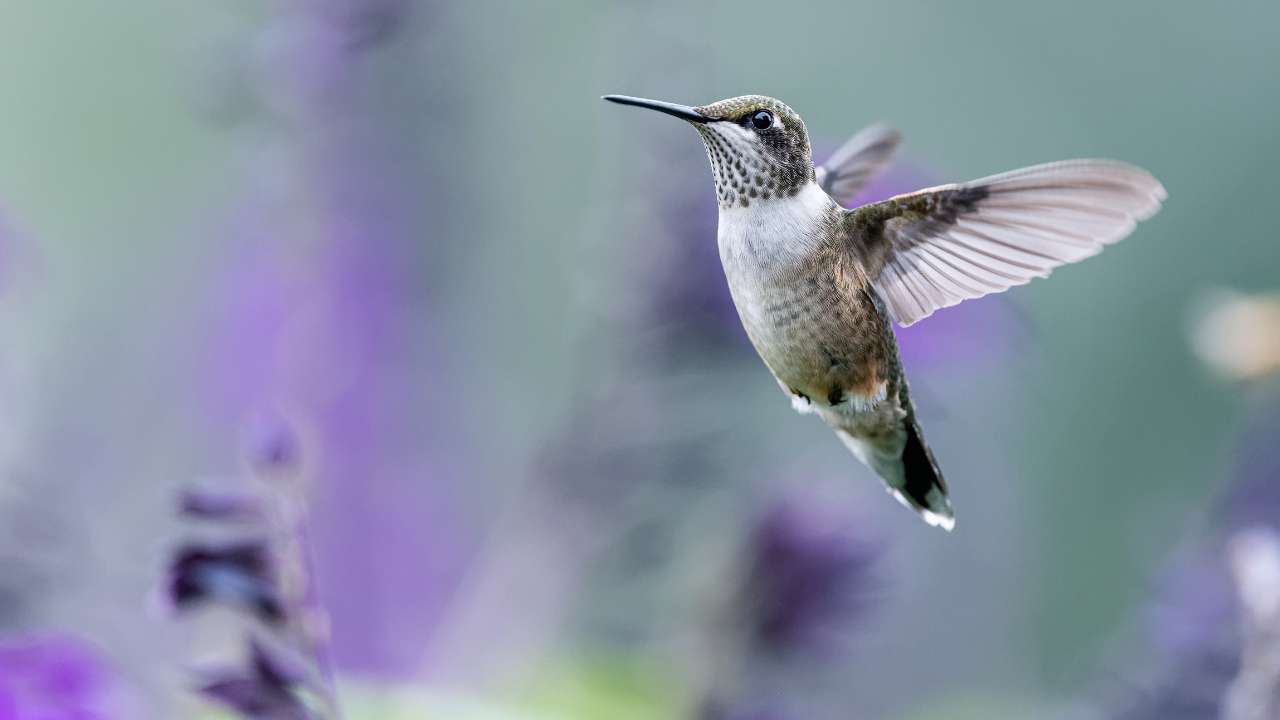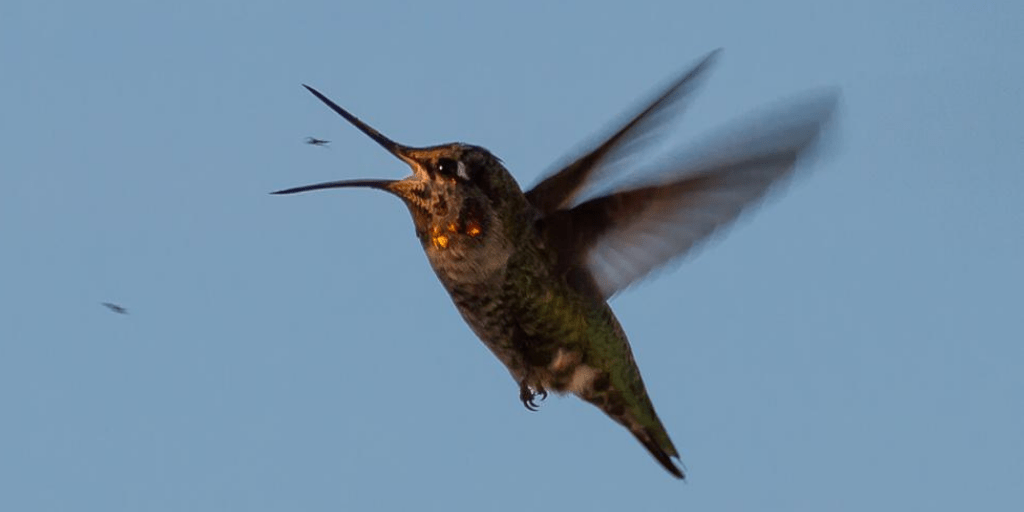Do Hummingbirds Eat Mosquitoes? The Fascinating Feeding Habits Of Hummingbirds
Hummingbirds are known to feed mostly on plants, flowers, and feeders that people provide for them. They are, however, prone to consuming the rare bug or insect as they flit by. But do hummingbirds eat mosquitoes?
Author:Maya ReyesReviewer:Sophia HarperOct 09, 202337.7K Shares878.2K Views

Hummingbirds are known to feed mostly on plants, flowers, and feeders that people provide for them. They are, however, prone to consuming the rare bug or insect as they flit by. But do hummingbirds eat mosquitoes?
Hummingbirds like eating mosquitos. Hummers are sometimes referred to be nature's pest management since they will snap them out of the air if they go too near. Hummingbirds depend on flying bugs and other minibeasts for protein, among other things.
Do Hummingbirds Eat Mosquitoes?
In a word, yes. A mosquito is a delicious feast for a hummingbird. In small yards, they serve as a reliable natural method of pest management by maintaining a stable population of insects like mosquitoes.
They get most of the protein, vitamins, and other nutrients they need from the mosquitoes they consume.
How Hummingbirds Catch Mosquitoes
Hummingbirds like the ruby-throated hummingbird usually have to capture mosquitoes in flight since mature mosquitoes are wingless creatures.
Many features of hummingbirds make them ideal prey for catching mosquitoes and other insects. They have acute vision and can see mosquitoes and other small insects from great distances.
Their large, pointed wings and tail feathers let them to fly efficiently and manoeuvre accurately, allowing them to be both fast in the air and nimble on the ground, making them excellent fliers and catchers.
Their large, narrow beak is another useful tool in the fight against insects. Their specialised beaks allow them to easily get the nectar in tubular blooms. Since their beaks are so long, they can collect insects without having to go too near to them.
They can grasp mosquitoes quickly and precisely thanks to their ability to swiftly expand and shut their beaks, which traps the insects and prevents them from escaping.
Hummingbirds will approach an insect like a mosquito and hover around until they can swat it out of the air and consume it whole.
Hummingbirds prey on more than just flying insects. Hummingbirds love to hang around in pools of stagnant water because the birds can readily scoop up mosquito larvae from the surface. When the mosquitoes are resting or caught in a web, they may be easily plucked off.
Do Hummingbirds Eat Insects?
Hummingbirds need the nectar from flowers in addition to the sugar water in hummingbird feeders. Hummingbirds need protein for growth of its muscles and feathers, thus it gets this by eating insects. The amino acids, lipids, fibre, salts, and other elements necessary for a healthy diet may all be found in insects.
Hummingbirds often eat small, flying insects that they can catch in their beaks and consume whole, such ants, aphids, beetles, gnats, mosquitoes, and even certain species of wasps. Hummingbirds also feed on bug eggs and larvae.
Hummingbirds have been seen eating anywhere from several hundred to a thousand insects in a single day, however this number fluctuates widely based on factors including bug availability, insect variety, and the hummingbird's nutritional requirements.
Hummingbirds may be seen snatching insects off the undersides of leaves, from spider webs, from the air, and from the mouths of insects that have been feasting on flowers. Hummingbirds are unable to dismember their prey due to their small stature and long, thin beaks. Thus, hummingbirds consume insects intact.
Why Do Hummingbirds Eat Mosquitoes?
Carbohydrates and proteins make up the bulk of a hummingbird's diet. They get the glucose and fructose they need from the nectar of blooming plants.
However, where do they receive the protein that they need? Insects such as spiders and the aforementioned flies, aphids, gnats, mites, beetles, and mosquitoes play a crucial role in this regard.
Hummingbirds gain the proteins, vitamins, and many other critical elements they need that nectar doesn't provide by eating insects and spiders. Up to 80% of their diet may consist of insects and spiders.
Hummingbirds love eating mosquitoes because they are the ideal bug prey. They are easily metabolised and digested due to their tiny size and soft consistency, making them suitable for whole-mouth ingestion.
During the summer, mosquito populations often peak, making them an ideal prey item. They have a high rate of reproduction and tend to show up close to people's homes, often where bird feeders are hung.
Hummingbirds aren't mosquito specialists. Instead, they consume them when they get the chance. Hummingbirds often eat mosquitoes that are attracted to the nectar of flowers and hummingbird feeders.
Do Hummingbirds Control Mosquitoes?
If you have an out-of-control mosquito population in your yard, you may depend on hummingbirds to help curb the population. Hummingbirds have a voracious appetite in order to sustain their high metabolic rate.
They may consume one to three times their body weight in insects every day. In a single day, they may consume hundreds of mosquitoes and other insects.
Because they devour so many insects, their mosquito-control skills seem promising. However, for them to be successful, you must have a large number of hummingbirds visiting your yard on a daily basis.
Another factor to remember is that hummingbirds consume other insects, so they aren't assured to solely eat mosquitoes.
Other mosquito predators such as nighthawks, swallows, warblers, woodpeckers, wrens and orioles may assist lower the local mosquito population if you have a natural yard setting.
Unfortunately, mosquitos are often so prevalent throughout the summer that predators have little effect on their population growth.
When natural pest management methods fail, the alternative is to apply insecticides to kill mosquitos. However, employing pesticides harms the environment and is not suggested until absolutely necessary.
Using birds like hummingbirds instead of pesticides is considerably better for the environment since chemicals may hurt other wildlife in your yard.
Hummingbirds can manage a modest mosquito population in a short region, but a huge area with an out-of-control population would be too difficult for tiny hummingbirds to regulate.
As long as your yard has a healthy ecology, mosquitoes should not proliferate uncontrollably, and hummingbirds should be able to manage the mosquito population with the aid of other mosquito-eating species.
Hummingbirds And Mosquitoes
Hummingbirds devour mosquitos because of their opportunistic feeding behaviours, which are drawn by carbon dioxide and body heat. If the occasion comes, hummers can take care of these little bloodsuckers for us.
Hummingbirds can flit about sweet-smelling plants and fruit, and they can even 'fish' mosquitoes out of spider webs and nests if they are near to their feeding zones.
Mosquitoes seldom compete for food with hummingbirds, and winged pollinators rarely hunt them down. When there are mosquitoes around, a hummingbird will open its mouth and snap open and back again to ingest them.
Hummingbirds do not have favourite meals, but they mostly feast on the colourful plants and flowers in your yard. Mosquitoes are a byproduct of having a wild yard, which hummers will happily take care of.
The greatest way to attract hummingbirds is to create a natural garden full of diverse flowers. Hummingbirds may eat up to three times their body weight in food each day, so providing enough sustenance for local pollinators will keep them coming back. Grow snapdragons, morning glories, fuchsias, and trumpet-shaped flowers since they favour these blossoms above all others.
If you can frequently attract hummingbirds to your garden and have a problem with a burgeoning mosquito population, feeding the birds is a better option than using insecticides.
Many pesticides and mosquito repellents may damage other creatures in your garden, and depending on insecticides might encourage local pests to develop resistance to regular sprayings. Many people prioritise hummingbirds since the ecology takes care of itself.
The Hummingbird-Mosquito Connection
Hummingbirds and mosquitoes, two small creatures often found in our outdoor spaces, have an interesting connection, although not in the way you might expect.
While both play essential roles in the ecosystems they inhabit, they don't interact in the manner one might assume, such as hummingbirds actively seeking out and consuming mosquitoes. Let's explore the hummingbird-mosquito connection in more detail:
Hummingbirds - The Tiny Avian Wonders
Hummingbirds are renowned for their iridescent plumage, remarkable hovering abilities, and their insatiable appetite for nectar. They are nature's pollinators, transferring pollen from flower to flower as they feed on nectar.
This mutualistic relationship benefits both the hummingbirds and the plants they visit. As hummingbirds feed on nectar, they inadvertently fertilize flowers, aiding in the plant's reproduction.
Mosquitoes - Not On The Hummingbird's Menu
Contrary to popular belief, mosquitoes are not a staple in the hummingbird's diet. While hummingbirds are known to consume small insects and spiders to supplement their nectar-based diet with much-needed protein, mosquitoes do not make up a significant portion of their prey.
These tiny birds primarily focus on capturing tiny flying insects, often caught mid-flight or picked from spider webs.
The Ecological Roles They Play
Both hummingbirds and mosquitoes have specific ecological roles. Hummingbirds contribute to plant pollination, helping maintain the biodiversity of flowering plants.
In contrast, mosquitoes serve as a food source for various other creatures, such as birds, bats, and insects, making them part of complex food webs.
Attracting Hummingbirds To Your Garden
While hummingbirds may not be your go-to solution for mosquito control, you can still attract these delightful creatures to your garden by planting nectar-rich flowers.
Creating a hummingbird-friendly habitat not only adds beauty to your outdoor space but also supports these important pollinators.
While hummingbirds and mosquitoes coexist in our outdoor environments, their interactions are not as direct as one might think.
Hummingbirds primarily feed on nectar and catch small insects for protein, but mosquitoes do not form a substantial part of their diet. Instead, both these tiny creatures contribute to the intricate balance of nature in their unique ways.
Gardening Tips To Attract Hummingbirds, Repel Mosquitoes
Gardening with the intention of attracting hummingbirds while repelling mosquitoes is a wonderful way to create a vibrant and mosquito-free outdoor space. Here are some effective gardening tips to achieve this:
- Plant Hummingbird-Friendly Flowers - Choose nectar-rich, brightly colored flowers such as salvia, bee balm, trumpet vine, and fuchsia to attract hummingbirds. Plant these flowers in clusters or groups to create a visually appealing and hummingbird-friendly garden.
- Provide Shelter - Hummingbirds need safe resting spots. Plant shrubs or trees where they can perch and take shelter. Consider adding hummingbird feeders to supplement their nectar intake.
- Avoid Insecticides - Refrain from using chemical insecticides in your garden, as they can harm both hummingbirds and the insects they feed on.
- Mosquito-Repelling Plants - Incorporate mosquito-repelling plants like citronella, lavender, marigold, and basil into your garden. These plants emit scents that mosquitoes find unpleasant.
- Eliminate Standing Water - Mosquitoes breed in stagnant water. Remove any containers or areas that collect water to reduce mosquito breeding sites.
- Use Fans - Place fans in your outdoor area to create airflow. Mosquitoes are poor flyers and have trouble navigating in windy conditions.
- Natural Repellents - Consider using natural mosquito repellents like citronella candles or mosquito-repelling essential oils to keep these pests at bay.
- Regular Maintenance - Keep your garden well-maintained by pruning overgrown plants and clearing debris. This prevents mosquitoes from finding hiding spots.
- Bird Baths - Install bird baths, which not only attract birds but also provide a water source for them to bathe and drink. Hummingbirds appreciate clean water.
- Timing Matters - Plan outdoor activities and gardening during times when mosquitoes are less active, typically during the early morning and late afternoon.
By implementing these gardening tips, you can create an environment that is inviting to hummingbirds while deterring mosquitoes, making your outdoor space more enjoyable for both you and the wildlife.
FAQs - Do Hummingbirds Eat Mosquitoes?
Can Hummingbirds Control Mosquitoes Naturally?
Hummingbirds primarily feed on flower nectar and insects, but their diet does not include mosquitoes as a significant part. While they might occasionally consume a mosquito, it's not a primary food source for them.
What Do Hummingbirds Eat Besides Nectar?
In addition to nectar, hummingbirds also consume small insects and spiders for protein. They catch insects in flight or by plucking them from spider webs. While they may eat some tiny insects, they don't target mosquitoes specifically.
Do Hummingbirds Help Reduce Mosquito Populations?
Hummingbirds play a role in maintaining ecological balance by controlling insect populations to some extent. However, they do not have a significant impact on mosquito populations due to differences in feeding habits and the relatively small number of mosquitoes in their diet.
Can Hummingbirds Be Attracted To Control Mosquitoes In Gardens?
While hummingbirds won't significantly control mosquitoes, you can attract them to your garden by planting nectar-rich flowers. This can add beauty to your garden and create a habitat that supports hummingbirds.
Are There Better Methods To Control Mosquitoes In Gardens?
To control mosquitoes effectively in your garden, consider using mosquito-repellent plants, installing mosquito traps, or implementing other mosquito control methods, as relying on hummingbirds alone is not a practical mosquito control strategy.
Final Words
Hummingbirds are a beautiful species of birds with a surprisingly enormous appetite. They may consume up to three times their body weight in insects each day, in addition to nectar.
Do hummingbirds eat mosquitoes? Hummingbirds are well adapted to eating mosquitos and can even capture them while flying. In a small yard, they may manage the mosquito population while doing their everyday routines and amaze spectators.
Jump to
Do Hummingbirds Eat Mosquitoes?
How Hummingbirds Catch Mosquitoes
Do Hummingbirds Eat Insects?
Why Do Hummingbirds Eat Mosquitoes?
Do Hummingbirds Control Mosquitoes?
Hummingbirds And Mosquitoes
The Hummingbird-Mosquito Connection
Gardening Tips To Attract Hummingbirds, Repel Mosquitoes
FAQs - Do Hummingbirds Eat Mosquitoes?
Final Words

Maya Reyes
Author
Maya Reyes’s wanderlust was sparked in the temples of Luang Prabang, where the scent of lemongrass and the chants of monks revealed the transformative power of travel.
Since then, her journey has been defined by cultural immersion and authentic connections. From learning batik in Indonesia to sharing meals with nomadic families in Mongolia, Maya seeks experiences that highlight the human stories behind each destination.
Travel for her is a way to weave her narrative into the world’s cultural tapestry, creating bridges across diverse ways of life. Maya has traveled to 15 countries and shares her insights through writing and storytelling.

Sophia Harper
Reviewer
Sophia Harper’s photography acts as a portal to the soul of the places she visits. Drawn to South America’s landscapes and cultures, she has spent years capturing everything from the majesty of ancient ruins to the vibrancy of urban streets.
Sophia’s work isn’t just about documenting moments; it’s about evoking the emotions and stories behind them. A dedicated photographer, she has worked with local communities across South America to capture their rich cultural narratives through her lens.
Latest Articles
Popular Articles
